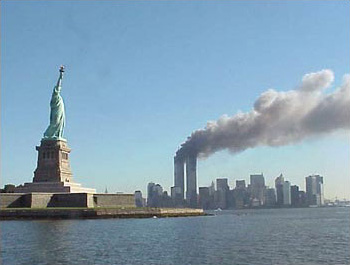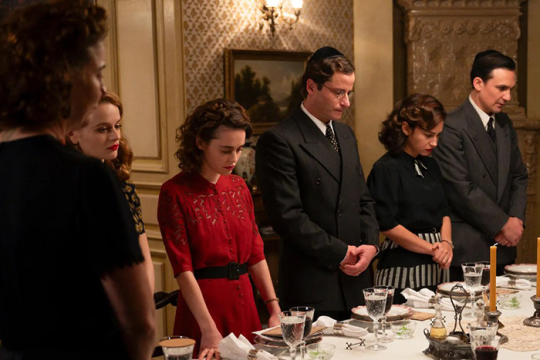
On the morning of September 11, 2001, I remember pausing on the playground to listen to an announcement over the loudspeaker: “Attention students: if one or both of your parents works in New York City, please come to the main office. A fire has caused major traffic jams in and out of the city so your parents might be home later than usual.” I had my dad’s work schedule memorized: Mondays and Wednesdays were his New York days, so on September 11, like all Tuesdays, he worked from his office close to our home in New Jersey. I rejoined my friends on the monkey bars. My mom met me at the bus stop that day after school. The short walk home was silent. She sat me down before we entered the house and told me that two planes had crashed into the Twin Towers, destroying them and killing hundreds of people. “Okay,” I said to my mom. I went inside and saw my grandparents, who were visiting from out of town, motionless in the TV room. I wasn’t allowed in so I went up to my room. In the days and weeks after 9/11 I learned little about terrorism or the extremism that fueled it. In fourth grade, it wasn’t really on my mind. But I have come to learn how that day has influenced the way Muslims are treated in the United States. This summer, I have been interning at Interfaith Alliance, an organization dedicated to protecting faith and freedom for about 70 faith traditions. One key component of its agenda is taking a stand against anti-Muslim bigotry in the United States. In late June I staffed and participated in a daylong symposium co-sponsored by Interfaith Alliance called “Reason Versus Rhetoric: Understanding American Muslims.” The symposium featured all sorts of speakers who addressed issues pertaining to Muslim America, like Shari'ah law and the controversial Park51 mosque (known more colloquially as the “ground zero mosque”). The symposium confirmed what I had imagined about the American Muslim population. Naturally, the fact that Muslims make up some 23% of the world’s population means there is more than one way to be Muslim. Some are children of immigrants that came to this country in search of a better life, and dedicate their existence to securing that dream for their families. And most Muslims fear external forces that tempt innocent children down the dark path to extremism. My great-grandparents were immigrants to this country. I am sure that they too struggled with being different from their new American neighbors, and I imagined that they feared for their children and wondered if coming to the New World was the right choice. Although American law enables individuals to live in freedom, there are always factions of our society set out to dismantle our liberty with scare tactics and racism. America can and should erect walls to protect itself from terror and anyone associated likely to commit terrorist acts. America can also confront these national security threats by promoting policy rooted in the values that have kept this country strong and free for 236 years. But these goals are not advanced by holding hearings to assess the radicalization of the entire Muslim American community, as Peter King (R-NY) has done five times this congress. Nor are our common goals achieved by enacting policies like the “Absconder Apprehension Initiative,” the Bush-era policy that subjects the estimated 10,000 undocumented immigrants of Arab descent in this country to harsher interrogation and deportation protocol than undocumented immigrants of other ethnic backgrounds. Championing racial profiling policies to the American people as a way to protect our country is utterly misguided, to say the least. These policies infringe on American Muslims’ civil rights and undermine the struggle of all Americans, including Jews. Racial profiling threatens the stability of our society because it is contrary to the basic values of the United States of America. I really believe that the Tuesday morning at the beginning of my fourth grade year changed everything. Some say that where you stand depends on where you sit. If, as Americans, we sit in too-long airport security lines and in the backs of police cars for appearing Arab, our core American values disintegrate. If we sit behind steel reinforced security doors and bulletproof glass, we send a message of intolerance and fear instead of one of pragmatism and peace. Where we really should be sitting is at symposiums and dinner tables with those dedicated to pragmatic ways to eliminate terror. Racial profiling policies upend that concept and instill fear in our collective conscience. Noah Westreich is a participant in the Machon Kaplan Summer Social Action Internship Program. He is an intern at Interfaith Alliance. Photo courtesy of WorldStatesmen.Org
Related Posts

“We Were the Lucky Ones:” Bringing The Holocaust Out of History Books and Into Our Homes

Harnessing the Power of our Mothers Around the Seder Table

